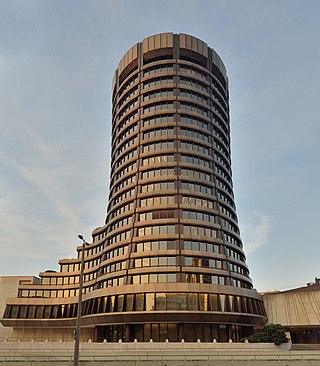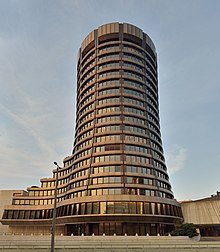
The Bank for International Settlements (BIS) is an international financial institution which is owned by member central banks. Its primary goal is to foster international monetary and financial cooperation while serving as a bank for central banks. With its establishment in 1930 it is the oldest international financial institution. Its initial purpose was to oversee the settlement of World War I war reparations.
Operational risk is the risk of losses caused by flawed or failed processes, policies, systems or events that disrupt business operations. Employee errors, criminal activity such as fraud, and physical events are among the factors that can trigger operational risk. The process to manage operational risk is known as operational risk management. The definition of operational risk, adopted by the European Solvency II Directive for insurers, is a variation adopted from the Basel II regulations for banks: "The risk of a change in value caused by the fact that actual losses, incurred for inadequate or failed internal processes, people and systems, or from external events, differ from the expected losses". The scope of operational risk is then broad, and can also include other classes of risks, such as fraud, security, privacy protection, legal risks, physical or environmental risks. Operational risks similarly may impact broadly, in that they can affect client satisfaction, reputation and shareholder value, all while increasing business volatility.
The Basel Accords refer to the banking supervision accords issued by the Basel Committee on Banking Supervision (BCBS).

Banking regulation and supervision refers to a form of financial regulation which subjects banks to certain requirements, restrictions and guidelines, enforced by a financial regulatory authority generally referred to as banking supervisor, with semantic variations across jurisdictions. By and large, banking regulation and supervision aims at ensuring that banks are safe and sound and at fostering market transparency between banks and the individuals and corporations with whom they conduct business.
Basel II is the second of the Basel Accords, which are recommendations on banking laws and regulations issued by the Basel Committee on Banking Supervision. It is now extended and partially superseded by Basel III.
Tier 1 capital is the core measure of a bank's financial strength from a regulator's point of view. It is composed of core capital, which consists primarily of common stock and disclosed reserves, but may also include non-redeemable non-cumulative preferred stock. The Basel Committee also observed that banks have used innovative instruments over the years to generate Tier 1 capital; these are subject to stringent conditions and are limited to a maximum of 15% of total Tier 1 capital. This part of the Tier 1 capital will be phased out during the implementation of Basel III.
Basel I is the first Basel Accord. It arose from deliberations by central bankers from major countries during the late 1970s and 1980s. In 1988, the Basel Committee on Banking Supervision (BCBS) in Basel, Switzerland, published a set of minimum capital requirements for banks. It is also known as the 1988 Basel Accord, and was enforced by law in the Group of Ten (G-10) countries in 1992.
Advanced measurement approach (AMA) is one of three possible operational risk methods that can be used under Basel II by a bank or other financial institution. The other two are the Basic Indicator Approach and the Standardised Approach. The methods increase in sophistication and risk sensitivity with AMA being the most advanced of the three.

The Financial Supervisory Service (FSS) is South Korea's integrated financial regulator that examines and supervises financial institutions under the broad oversight of the Financial Services Commission (FSC), the government regulatory authority staffed by civil servants.
The International Association of Insurance Supervisors (IAIS) is a membership organization of insurance supervisors from more than 200 jurisdictions, constituting 97% of the world's insurance premiums. It is the international standards-setting body for the insurance sector. The IAIS was established in 1994 and operates as a verein, a type of non-profit organisation under Swiss Civil Law.
Macroprudential regulation is the approach to financial regulation that aims to mitigate risk to the financial system as a whole. After the 2007–2008 financial crisis, there has been a growing consensus among policymakers and economic researchers about the need to re-orient the regulatory framework towards a macroprudential perspective.
The Joint Forum is an international group bringing together financial regulatory representatives from banking, insurance and securities. It works under the international bodies for these sectors, the Basel Committee on Banking Supervision (BCBS), the International Organization of Securities Commissions (IOSCO) and the International Association of Insurance Supervisors (IAIS). The group develops guidance, principles and identifies best practices that are of common interest to all three sectors.
Basel III is the third Basel Accord, a framework that sets international standards for bank capital adequacy, stress testing, and liquidity requirements. Augmenting and superseding parts of the Basel II standards, it was developed in response to the deficiencies in financial regulation revealed by the financial crisis of 2007–08. It is intended to strengthen bank capital requirements by increasing minimum capital requirements, holdings of high quality liquid assets, and decreasing bank leverage.

Arnout Henricus Elisabeth Maria "Nout" Wellink is a Dutch economist and former central banker.
During the financial crisis of 2007–2008, several banks, including the UK's Northern Rock and the U.S. investment banks Bear Stearns and Lehman Brothers, suffered a liquidity crisis, due to their over-reliance on short-term wholesale funding from the interbank lending market. As a result, the G20 launched an overhaul of banking regulation known as Basel III. In addition to changes in capital requirements, Basel III also contains two entirely new liquidity requirements: the net stable funding ratio (NSFR) and the liquidity coverage ratio (LCR).
A systemically important financial institution (SIFI) is a bank, insurance company, or other financial institution whose failure might trigger a financial crisis. They are colloquially referred to as "too big to fail".

The International Association of Deposit Insurers (IADI) was formed on 6 May 2002 with the purpose of sharing deposit insurance expertise with the world and contributing to the stability of financial systems as the standard setter for deposit insurance with a global and expanding membership.

European Banking Supervision, also known as the Single Supervisory Mechanism (SSM), is the policy framework for the prudential supervision of banks in the euro area. It is centered on the European Central Bank (ECB), whose supervisory arm is referred to as ECB Banking Supervision. EU member states outside of the euro area can also participate on a voluntary basis, as was the case of Bulgaria as of late 2023. European Banking Supervision was established by Regulation 1024/2013 of the Council, also known as the SSM Regulation, which also created its central decision-making body, the ECB Supervisory Board.
Basel III: Finalising post-crisis reforms, sometimes called the Basel III Endgame, Basel 3.1 or CRR3, are changes to international standards for bank capital requirements that were agreed by the Basel Committee on Banking Supervision (BCBS) in 2017 and are due for implementation in January 2023. They amend the international banking standards known as the Basel Accords.

The Capital Requirements Regulation(EU) No. 575/2013 is an EU law that aims to decrease the likelihood that banks go insolvent. With the Credit Institutions Directive 2013 the Capital Requirements Regulation 2013 reflects Basel III rules on capital measurement and capital standards.







